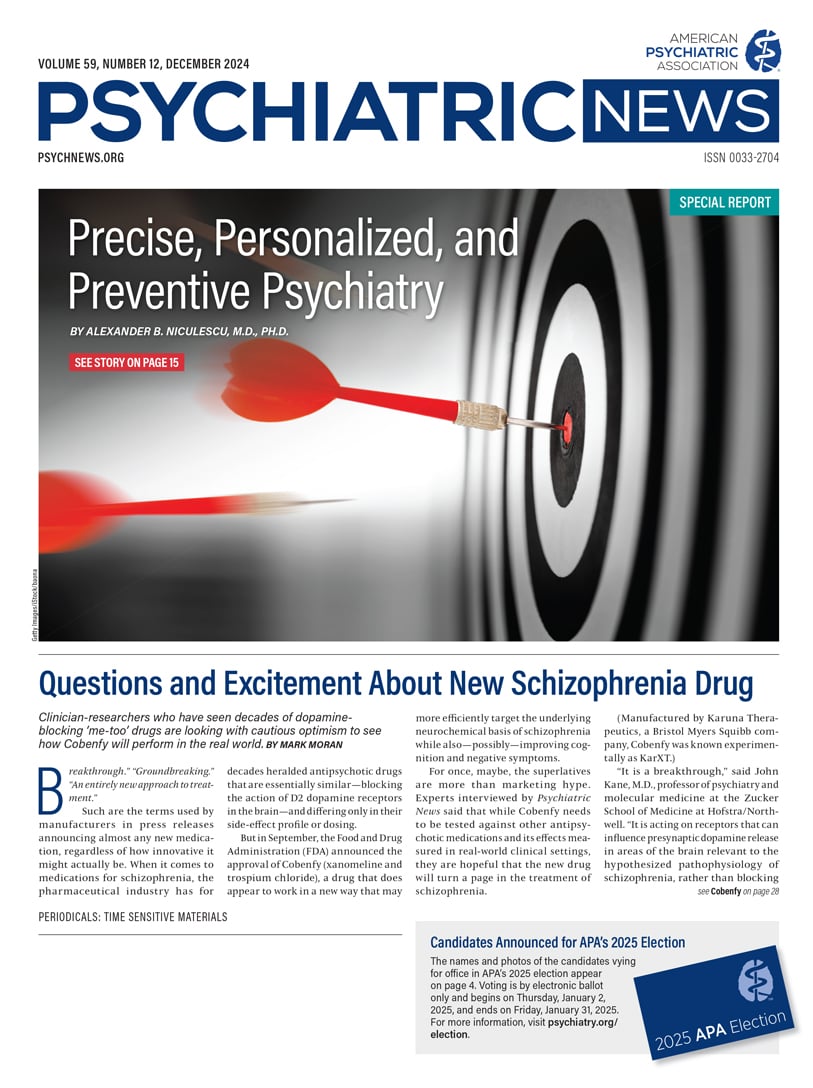APA Urges FDA to Limit Clozapine REMS to Education Only
In advance of the Food and Drug Administration’s (FDA) November 19 joint committee meeting on the Clozapine Risk Evaluation and Mitigation Strategy (REMS) program, APA filed comments urging the agency to consider reducing the scope of the REMS to focus on education only.
“Clozapine is a highly underutilized, potentially life-saving treatment for patients with treatment-resistant schizophrenia, and among prescribers, the Clozapine REMS system is perceived as an obstacle to increasing clozapine utilization,” APA wrote. As a result, only 4.4% to 4.8% of individuals with schizophrenia in the United States are prescribed the medication, with Black and Hispanic patients significantly less likely to receive it than White/Caucasian patients.
The goal of the Clozapine REMS program was to ensure patient monitoring for clozapine-induced severe neutropenia. Yet research has shown that the prevalence of severe neutropenia due to clozapine is extremely low, at just 0.4%, with peak incident typically within the first month. “Modifications to the Clozapine REMS could aim to better balance monitoring the risk of neutropenia versus the administrative burden caused by the REMS system,” according to the letter.
APA Mobilizes Members Against Step Therapy Protocols
As part of an advocacy campaign coordinated by APA, members have written to their congressional representatives, urging them to support the bipartisan Safe Step Act (H.R. 2630/S. 652).
The bill would place reasonable limits on insurance plans’ use of “fail first” or step therapy, which requires patients to try and fail on a less expensive option before a plan will cover the medication originally prescribed by their physician. It would also require plans to create a clear and timely process for requesting exemptions.
The bill would allow patients to request an exception to step therapy when a treatment is expected to be ineffective, cause an adverse reaction, decrease the individual’s ability to perform daily activities or occupational responsibilities, or when the individual is already stable on other medications. Plans must respond within three days of receiving a request or 24 hours if the protocol jeopardizes the patient’s life or health. The bill would also require that physicians and pharmacists have input on the design of step therapy and other nonmedical drug switching protocols.
As many as 36 states have laws that limit step therapy, but enforcement has been inconsistent; the Safe Step Act would amend the Employee Retirement Income Security Act (ERISA) to extend it to employer-sponsored plans.
APA Supports STAR Plus Scholarship Act
APA has expressed its support for the Substance Use Disorder Treatment and Recovery (STAR) Plus Scholarship Act (H.R. 9581), introduced by Rep. Andrea Salinas (D-Ore.) in September, which would create a new scholarship for students pursuing a degree in the mental health or substance use disorder treatment profession.
“There are simply not enough clinicians to address the mental health crisis in this country,” said APA CEO and Medical Director Marketa M. Wills, M.D., M.B.A. “The APA applauds Rep. Salinas for introducing The STAR Plus Scholarship Act. This critical legislation would help alleviate the behavioral health care shortage and diversify our workforce to enhance access to much needed care.”
APA Urges Optum Behavioral Health to End Pre-Payment Audits
After members of APA and the American Psychological Association reported a barrage of pre-payment audits from Optum Behavioral Health, the organizations joined forces to send a letter urging Optum to end the practice.
The letter states that the reviews are imposing “enormous financial and administrative strains” and that many of those affected are in small practices with limited financial and administrative support. In addition, APA’s outreach to medical professional groups suggested that Optum’s pre-payment audits may be targeting mental health providers far more heavily than medical/surgical providers.
Furthermore, the organizations expressed concern the audits are being conducted without clear protocols, and are undermining patient privacy, damaging the therapeutic relationship, and limiting access to care. “We have numerous reports from our members, as well as media reports, of Optum patients stopping mental health treatment because of fears that Optum will not reimburse them,” according to the letter.
Both APAs are continuing to work with Optum to clarify the scope and intent of these audits.
